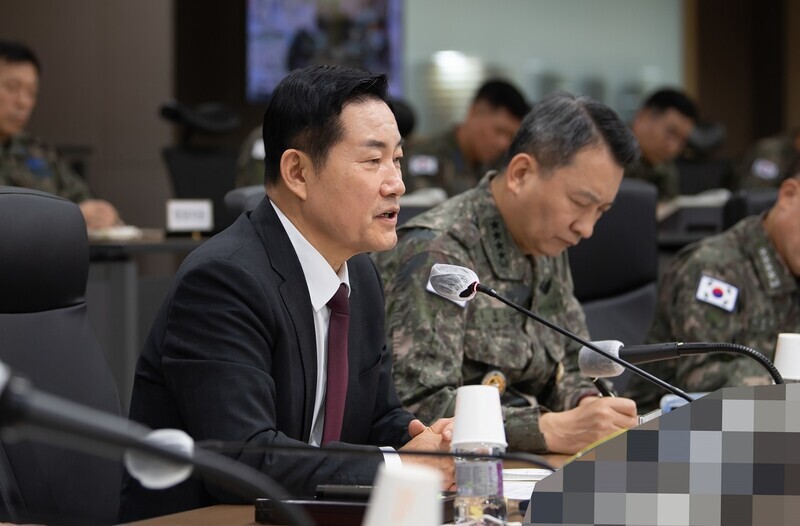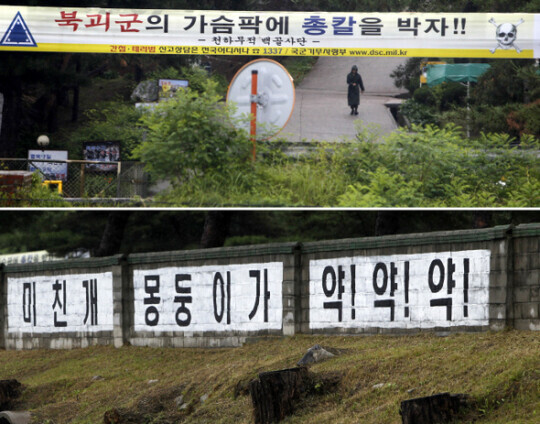hankyoreh
Links to other country sites 다른 나라 사이트 링크
- All
- National
- North Korea
- International
- Eco-Business
- Culture
- Editorial-Opinion
-
The Jeju
April 3rd Incident
[Reporter’s notebook] Retaliation alone does not national defense make
Posted on : Oct.9,2023 16:16 KST Modified on : Oct.9,2023 16:16 KST
The newly appointed minister of defense would do well to recall that he’s no longer a soldier chanting about executing North Korean leaders, but a civilian member of the Cabinet who supervises the military

At his first official event since being appointed, Defense Minister Shin Won-sik holds a video teleconference meeting with key officials from the military during a visit to the command control center at the headquarters of the Joint Chiefs of Staff. (courtesy of the Ministry of National Defense)

Mottos of the White Skulls around the unit. The top reads “Let’s drive a bayonet in the heart of the North Korean puppet army!” while the bottom reads “The best medicine for a mad dog is a whipping!” (Hankyoreh file photos)

Editorial・opinion
![[Column] A year and a half of Yoon’s foreign, security policies has added to Korea risk [Column] A year and a half of Yoon’s foreign, security policies has added to Korea risk](https://flexible.img.hani.co.kr/flexible/normal/500/300/imgdb/original/2023/1226/1517035766989839.jpg) [Column] A year and a half of Yoon’s foreign, security policies has added to Korea risk
[Column] A year and a half of Yoon’s foreign, security policies has added to Korea risk![[Column] Korea’s diaspora discrimination [Column] Korea’s diaspora discrimination](https://flexible.img.hani.co.kr/flexible/normal/500/300/imgdb/original/2023/1225/3417034701814775.jpg) [Column] Korea’s diaspora discrimination
[Column] Korea’s diaspora discrimination- [Column] Climate hypocrisy by rich nations
- [Editorial] Korea’s Supreme Court once again rules Japanese firms must directly compensate forced labor victims
- [Editorial] With right-hand man as interim PPP leader, Yoon to solidify grip on party
- [Editorial] Pope’s OK’ing of blessings for same-sex couples should be wake-up call for Korea
- [Column] China’s insistence on “bright prospects” is stifling its economy
- [Column] Chun Doo-hwan and Roh Tae-woo, Yoon Suk-yeol and Han Dong-hoon
- [Column] Yoon’s oblivious diplomacy ended in expo rout – will it also fail to respond to N. Korea’s nukes?
- [Column] Yoon’s war on Korea’s free press earns him headlines in global news outlets
Most viewed articles
- 1Korea’s top constitutional expert predicts Yoon will be dismissed from office
- 2[Column] Giving Yoon the benefit of the doubt
- 3Korea’s steel industry could buckle under Trump’s tariff war
- 4Human rights watchdog draws criticism for recommending guarantees for Yoon’s right to defense
- 5‘Deeply mortified’: Moon apologizes to Koreans for enabling Yoon’s rise
- 6[Editorial] Choi’s ulterior motives for Seoul police chief appointment
- 7[Interview] South Korea’s Moon Jae-in has his regrets
- 8[Column] Trump may have won, but Yoon will lose
- 9[Editorial] Yoon’s prison politicking sounds a lot like a call to defy court
- 10How China used Korean pop culture for ‘cultural security,’ both before and after banning it